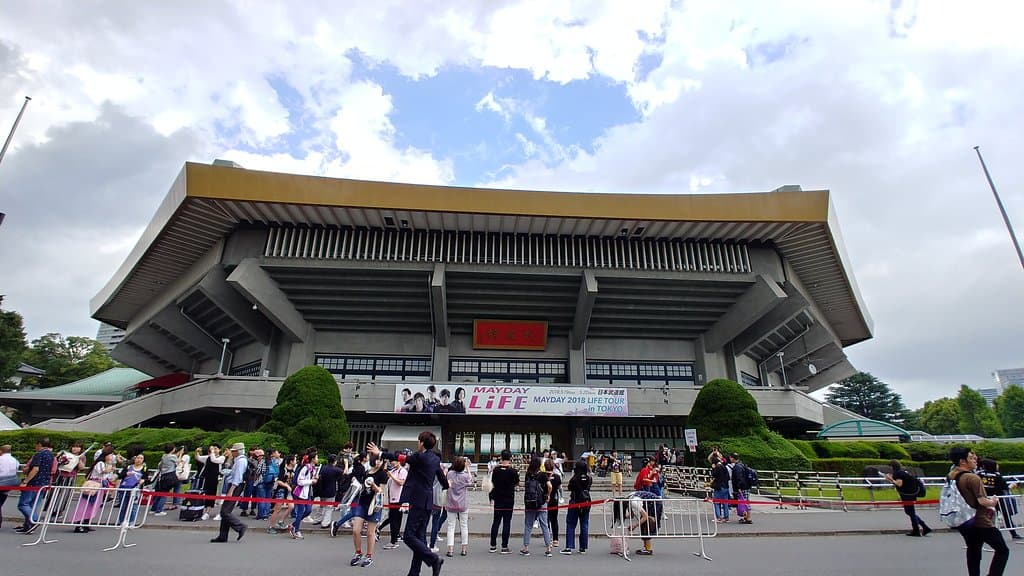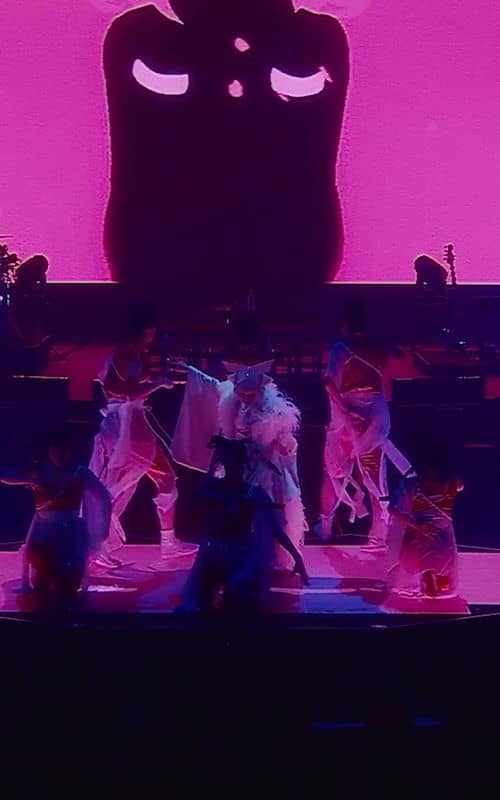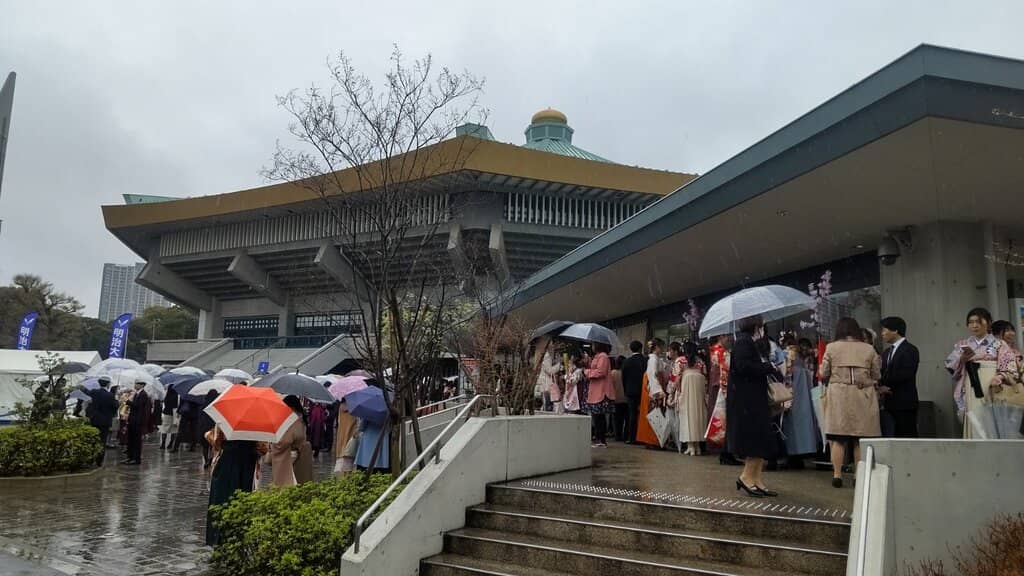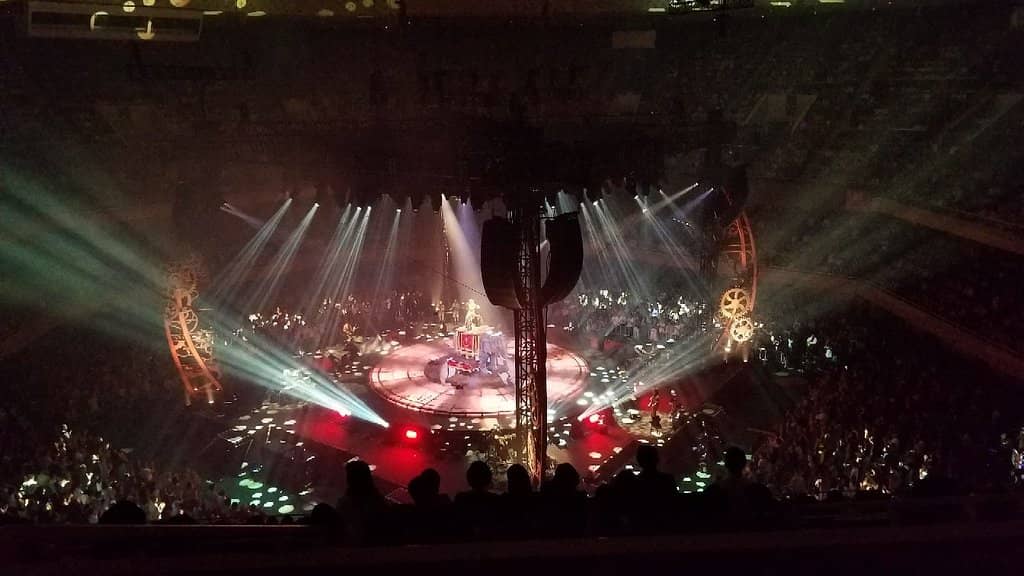
Nippon Budokan Tokyo
Tokyo's iconic octagonal arena, a legendary venue for martial arts and world-class live music performances.

Highlights
Must-see attractions

Social
From TikTok & Reddit
Best Time
Experience the electric atmosphere

Nippon Budokan Tokyo
Best Time
Experience the electric atmosphere

Highlights
Must-see attractions
Tokyo's iconic octagonal arena, a legendary venue for martial arts and world-class live music performances.
"A must-visit for music fans and a symbol of Tokyo's cultural landscape."

🎟️ Ticket Lottery Savvy
Foreigners often need to use lotteries or ticket proxies. Start early and research specific event sales.
🎒 Pack Lightly
Large backpacks are prohibited. Use small bags or check event-specific locker info.

Highlights
Discover the most iconic attractions and experiences

Iconic Octagonal Architecture
Exterior
Instantly recognizable octagonal design, a symbol of Tokyo's cultural landscape.

Legendary Concert Venue
Main Arena
Host to countless legendary performances by global and Japanese artists.

Martial Arts Heritage
Main Arena
Originally built for the 1964 Tokyo Olympics, it remains a premier martial arts venue.
Plans like a pro.
Thinks like you
Planning Your Visit
Ticket Acquisition Strategy
Bag Policy & On-Site Logistics
Best Times
Insider Tips
from TikTok, Instagram & Reddit
🎟️ Ticket Lottery Savvy
Foreigners often need to use lotteries or ticket proxies. Start early and research specific event sales.
🎒 Pack Lightly
Large backpacks are prohibited. Use small bags or check event-specific locker info.
Tips & Advice For Foreign Guests to Budokan
📱 Translator App Essential
Crucial for navigating ticketing and venue information if you don't speak Japanese.
⏰ Arrive Early
Doors usually open 30-60 mins before concerts. Allow time for security and finding your seat.
Question about Nihon Budōkan
Tips
from all over the internet
🎟️ Ticket Lottery Savvy
Foreigners often need to use lotteries or ticket proxies. Start early and research specific event sales.
🎒 Pack Lightly
Large backpacks are prohibited. Use small bags or check event-specific locker info.
📱 Translator App Essential
Crucial for navigating ticketing and venue information if you don't speak Japanese.
⏰ Arrive Early
Doors usually open 30-60 mins before concerts. Allow time for security and finding your seat.
👀 Seat Views Vary
Seats behind the stage can have obstructed views. Check venue maps for your section.
What Travellers Say
Reviews Summary
Nippon Budokan is revered as a legendary concert venue with an iconic architectural design. Visitors praise the electric atmosphere during events and its historical significance. However, the primary drawback is the difficulty foreigners face in acquiring tickets, and strict bag policies can be inconvenient.
"Iconic music/sports venue. Conveniently located in the center of Tokyo. Arena space is quite small, which is good if you are in it because it's close to the action."
su liu
"CYNDI LAUPER Girls Wanna Just Have Fun FAREWELL TOUR - Nippon Budokan 2025.4.22"
akio tamagawa
"We were there for an Eric Clapton concert, and the concert was great. The venue is quite dated though, and being somewhat typical westerners we don't fit the Japanese ideal for size. The seating is very small and not terribly comfortable. And there's only one path to the venue from the street so foot traffic really bottlenecks.
Now, that being said, it was a bucket list item for me to see a concert there because it has hosted so many noteworthy concerts over the years. I don't regret seeing this show, but I probably won't return unless it's an absolute can't miss."
DK Hipkins
What People Like
What People Dislike
Frequently Asked Questions
🚇 🗺️ Getting There
Nippon Budokan is easily accessible via public transport. The closest station is Kudanshita Station on the Toei Shinjuku Line and Tozai Line, a short walk away. Alternatively, you can use Jimbocho Station (Toei Mita Line, Tozai Line, Hanzomon Line) or Chidorigafuchi Station (Tozai Line).
On-site parking is very limited and usually reserved for event staff or VIPs. It's highly recommended to use public transportation to reach the venue.
While possible, it's a significant walk (around 45-60 minutes). Taking a train to Kudanshita Station is a much more practical option.
The Toei Shinjuku Line and Tozai Line to Kudanshita Station are generally considered the most convenient options for reaching Nippon Budokan.
Taxis can be found, but expect long queues after major concerts. Public transport is usually more efficient for departing crowds.
🎫 🎫 Tickets & Entry
Purchasing tickets as a foreigner can be tricky. Many events use lottery systems or require Japanese ticketing sites like Lawson Ticket, which may not support international cards or addresses. Consider using a ticket proxy service or checking resale platforms.
Large backpacks and oversized bags are generally not permitted inside the venue. Visitors are advised to check the specific event's policy, as rules can vary. Small bags are usually acceptable.
While ID checks are not common for most concerts, it's always a good idea to have identification with you. Some specific events or ticket types might require it.
Generally, visitors cannot enter the main arena during exhibitions or concert programs unless they have a ticket for that specific event.
'S' seats typically stand for 'Special seating' and are considered the best and most expensive seats in the venue, offering premium views.
🎫 🏟️ Onsite Experience
Nippon Budokan has a seating capacity of approximately 14,471 for concerts and martial arts events, though this can vary slightly depending on the stage setup.
Yes, typically there are concession stands selling food and beverages inside the venue during events. Some unique cafes like SOBA CAFE IKEMORI have also been noted nearby.
Concerts at Nippon Budokan are known for their energetic atmosphere, with passionate fans and world-class performers creating a memorable experience.
Recording and photography are generally prohibited during concerts to protect artists' copyrights. Violators may be asked to leave.
Seating is assigned, and the layout can vary. Seats behind the stage might offer a limited view, so it's good to check venue maps or past concert photos.
📸 📸 Photography
Photography and videography are strictly prohibited during concerts and performances. This is to protect intellectual property and ensure an uninterrupted experience for all attendees.
The iconic octagonal structure is best captured from various angles around the exterior. The surrounding park areas offer good vantage points, especially during daylight.
While the arena is being prepared, taking photos might be tolerated by some staff, but it's best to err on the side of caution and wait until the official start time or check with venue personnel.
Yes, flying drones is generally prohibited in densely populated urban areas like Tokyo, especially near public venues, due to safety and privacy regulations.
If photography were permitted, a camera with good low-light performance and a versatile lens (e.g., 24-70mm or a telephoto zoom) would be ideal. However, remember that recording is forbidden.
For Different Travelers
Tailored advice for your travel style
👨👩👧 Families with Kids
For families visiting Tokyo, exploring the Chidorigafuchi Moat nearby offers a more relaxed and accessible outdoor activity. The Budokan itself is more suited for older children or teenagers attending a concert with adult supervision, provided the music genre is appropriate.
🎶 Music Enthusiasts
Be prepared for the ticket acquisition challenge, as mentioned, but the effort is often rewarded with an unforgettable live music experience. The acoustics are generally excellent, and the sense of history within the arena adds a unique layer to any performance.
🥋 Martial Arts Aficionados
These events often draw passionate crowds and offer a glimpse into the discipline and skill of Japanese martial arts. Check the venue's schedule for any upcoming tournaments or championships during your visit.
Deep Dives
In-depth insights and expert knowledge
The History and Significance of Nippon Budokan
The venue's acoustics and intimate yet grand atmosphere have made it a dream destination for musicians. Many artists, both Japanese and Western, consider performing at the Budokan a significant career milestone. The sheer volume of legendary performances that have graced its stage solidifies its place in music history.
While primarily known for concerts and martial arts, the Budokan has also hosted other significant events, including political rallies and cultural festivals. Its enduring appeal lies in its blend of historical significance, architectural uniqueness, and its role as a vibrant hub for live entertainment in the heart of Tokyo.
Navigating Ticket Purchases for Foreigners
To overcome these challenges, many foreigners opt for ticket proxy services. These services act on your behalf to purchase tickets, often for a fee. It's crucial to research and choose a reputable proxy service to avoid scams. Alternatively, some events might have general sales periods or offer tickets through international vendors, but these are less common for high-demand shows.
It's also worth noting that some events might have specific policies for foreign attendees, so always check the official event website or ticketing platform for the most up-to-date information. Being prepared and starting your ticket search well in advance is key to a successful acquisition.
Concert Experience and Venue Etiquette
When it comes to venue etiquette, respect for performers and fellow attendees is paramount. Recording and photography are strictly prohibited during performances to protect artists' intellectual property and maintain the concert's integrity. Visitors are also reminded to be mindful of the bag policy, as large backpacks are not allowed inside, and locker availability can be limited.
Fans at the Budokan are known for their enthusiasm, and the atmosphere is often electric. Whether it's a rock band, an idol group, or a traditional artist, the shared experience of live music in this historic venue is something special.






Social
from TikTok, Instagram & Reddit